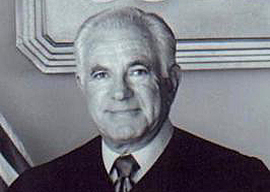
March 01, 2018

Joseph Wapner
Source: Wikimedia Commons
NEW YORK—If anybody in the reality TV world remembers Judge Wapner, the original host of The People’s Court, I doubt that they remember what he stood for.
He stood for the rule of law. The rule of law above all other considerations. The role of the courtroom was to apply law and nothing else. In other words, stop your sniveling, if you’re in the dock, and stop your grandstanding, if you’re a lawyer.
It was not uncommon, in a typical episode, for a person of bad character, obviously manipulating the system, to receive a favorable judgment. Wapner would admit that his hands were tied by the letter of the law and that the facts before him required a decision contrary to what would have been considered fair on the streets. He was even careful to point out that, because the case took place in, say, Connecticut, he would be wrong to apply a principle only known to the courts of California.
Daytime courtroom shows have long since abandoned any pretense of even knowing the law, much less applying it in a blind way. Judge Judy, the most popular of the pseudo-judges, regularly comments on the character, behavior, and attitude of people in her court.
To use just one example from several seasons ago, a man paying child support was appealing to her for a refund—he had absentmindedly continued to pay $50 a month for half a year after his child turned 18. Because his support payment was so low, Judge Judy glared at him and said, “Have you heard of looking a gift horse in the mouth?”—and ruled against him. She was essentially rewriting the child-support arrangement of a decade earlier, the one approved by a real judge who had the facts of the case before him. She was saying, “I don’t care what the law says, you’re a prick for asking for that money back.”
I was reminded of this last week when Judge Rosemarie Aquilina, a circuit court judge in Michigan, dramatically announced, “I just signed your death warrant,” as she sentenced Larry Nassar to 175 years in prison.
First of all, since she wasn’t technically signing a death warrant, you have to wonder whether she was threatening him with vigilante justice at that creepy prison on Lake Superior where the inmates once held the governor hostage. It’s the kind of place where child sex offenders are sometimes targeted for murder.
Secondly, she didn’t really need to say anything: 175 years kind of speaks for itself.
Third, her sentence was followed by day after day after day of victims’ testimony…that had no effect on the outcome of the trial or the sentence. This part of the process was apparently staged for the sole purpose of letting people vent by publicly shaming the criminal. It’s a sort of extended social-media version of the public stocks from Puritan times.
My dad was a lawyer. He wasn’t a full-time lawyer, he was a government agent who happened to have a law degree, but he appeared in court enough times to have some opinions about decorum, namely (a) you don’t get emotional, (b) if the witness gets emotional, you take a recess until they stop crying so it doesn’t affect the tenor of the proceedings, (c) you state what evidence you have but never what the facts are, because the jury or the judge determines the facts, and (d) you never make public statements about the case outside the courtroom.
The only courts I know of where these principles still reign today are military courts. A military prosecutor will never say, “This man murdered his wife”—and would probably be upbraided by the judge if he did so. Instead he says that exhibits A, B, and C and the testimony of D, E, and F contribute to what might be a “reasonable conclusion.” As an officer of the court, he’s laying it out there for someone else to decide. This used to be the custom in all trials, not just courts-martial. But at some point—I’m going to guess the early ’80s—somebody introduced into our Anglo-Saxon system a new set of rules that encouraged righteous anger, emotional pronouncements from the bench, and endless hours of so-called “victim’s testimony,” which is exactly the sort of emotional outpourings that used to be routinely banned by the courts as a means of ensuring that justice remained blind and unaffected by someone’s collateral suffering.